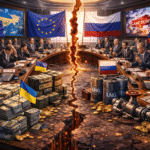Ukrainian President Volodymyr Zelenskyy has signaled a retreat from a controversial attempt to place the country’s top anti-corruption bodies under executive control, following widespread domestic protests and international criticism. The move, seen by many as a power grab, had sparked Ukraine’s largest anti-government demonstrations since the start of Russia’s full-scale invasion in 2022.
Revised Legislation Following Backlash
On Thursday, Zelenskyy announced the submission of a new draft law to the Verkhovna Rada (parliament) that he said would guarantee the independence of Ukraine’s anti-corruption institutions. He noted that the revised bill was developed after consultations with UK Prime Minister Keir Starmer, who had encouraged input from international experts to ensure transparency and accountability.
The previous version of the law had aimed to place the National Anti-Corruption Bureau (NABU) and the Specialised Anti-Corruption Prosecutor’s Office (SAPO) under the direct oversight of the prosecutor-general, a Zelenskyy appointee. Critics warned this would undermine Ukraine’s hard-won gains in anti-corruption reform.
Public Outcry and Political Fallout
Zelenskyy’s original proposal triggered widespread outrage. On Wednesday, over 10,000 demonstrators gathered in Kyiv — more than triple the turnout from the previous day — chanting slogans like “Shame!” and calling for the president to veto the law. Protests spread to major cities including Lviv, Odesa, and Kharkiv.
Many veterans and soldiers defied orders from military superiors to remain neutral, joining the protests in uniform. One double-amputee veteran held a sign near the presidential office reading: “We are fighting for Ukraine, not your impunity.”
In a national address, Zelenskyy acknowledged the growing dissent:
“Everyone has heard what people are saying. It’s not falling on deaf ears.”
Opposition lawmaker Yaroslav Zheleznyak said that he and 47 other MPs had introduced a separate bill to repeal the original amendments that had limited the independence of NABU and SAPO.
International Reactions
The president initially defended the proposal by claiming it was intended to better detect Russian infiltration. However, the move was sharply criticized by the European Union, G7 nations, and members of the U.S. Congress.
In a joint statement, Senators Jeanne Shaheen (D) and Lindsey Graham (R) warned:
“Ukraine has made enormous strides in combating corruption since 2014, but this new law risks undermining that progress.”
Echoes of Ukraine’s Past
Legal experts and activists compared the rapid and secretive passage of the original bill to the “dictatorship laws” enacted by pro-Russian president Viktor Yanukovych in 2014, which sparked the Euromaidan revolution.
Broader Context: War and Governance
The controversy comes at a precarious moment for Ukraine, as Russian ground forces make their fastest territorial gains in over a year and air strikes escalate. Overnight, a Russian drone attack on Odesa injured at least four people, according to regional governor Oleh Kiper.
Meanwhile, a third round of peace talks between Russian and Ukrainian delegations in Istanbul ended without meaningful progress. The Kremlin has dismissed the possibility of a summit between President Putin and President Zelenskyy before the end of August. Zelenskyy, however, maintains that only a face-to-face meeting with Putin can resolve the war — Europe’s largest conflict in generations.
Summary
- Zelenskyy has submitted a revised anti-corruption bill following mass protests and international pressure.
- The original legislation was widely seen as an attempt to weaken Ukraine’s anti-corruption institutions.
- Protests in Kyiv and other cities mark the largest public dissent since 2022.
- Critics warn the move echoes authoritarian measures from Ukraine’s past.
- The political crisis unfolds as Russia intensifies its military campaign and diplomatic efforts stall.








